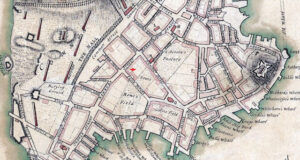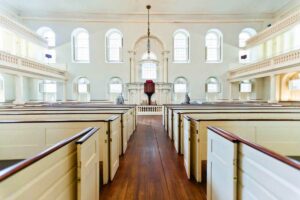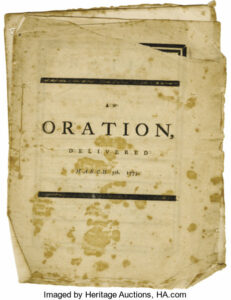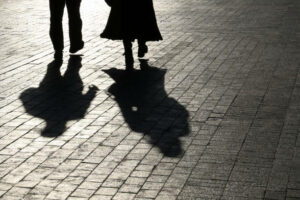Americanism Redux
March 2, on the journey to the American Founding, 250 years ago today, in 1773
Walk down Newbury Street. Come to the intersection with Pond Street. There’s the house, right over there, the big house with the fancy door. That’s your destination.
You’re about to knock on the fancy door. When the servant opens it you’ll ask for the owner. You need to see him.
You have a request. 250 years ago today.
Yes, it’s the last minute. The ceremony is three days away. Hundreds of people will be there. They’ll have looks of sorrow, of anger, of firmness, of determination. They won’t be smiling or laughing. They won’t be happy. They will be very, very attentive to the keynote speaker. Hang on his every word. Listen to the meaning in his remarks. Leave the ceremony with a clear purpose in their hearts and minds and souls. In another year and three days, the next keynote speaker will appear in next year’s version of this ceremony.
In a lot of ways, it’s the most important day of the year in our community.
You’re now standing inside the big house with the fancy door closed behind you. You’re waiting to speak to the owner. Sure, last-minute is last-minute, but there’s little doubt in your mind that this guy can pull it off. He can write the keynote speech in three days’ time, deliver it to the crowd in a stirring manner, and use the whole event to advance the cause further.
Glancing upward, you see him coming down the stairs.
(the home is the red dot in map center)
* * * * * * *
He’s impressive, no doubt about it. He’s smart, well-educated, known far and wide in the community. He’s wealthy, prominent, familiar with becoming involved in things that matter to the people who live here. And not least, he’s from a family that has been a source of leadership in this community for a long, long time. A hundred years ago, his great-grandfather was the most famous soldier in town, colony, and region, and he’d been a unique part of securing all three. Perhaps “soldier” wasn’t the right word. A better and more vivid choice: “warrior.” Yes, his great-grandfather was a warrior of a truly distinct type—he was one-of-kind and first-of-a-kind, the very first British colonist who, for some reason, didn’t quite fit in with the rules of war, the restrictions of war, the conventions of war. No, not at all. He was the first, the prototype, of the New World Man who preferred to wage war like the warriors of Native tribes. Instinctively, he became them. He chose to hide in the woods, lunge with speed, and often inflict the kind of death and suffering that, somehow, seemed different than was done elsewhere. Then he’d vanish. He was also a bit of a braggart and a self-promoter, author of a best-selling book about his Native-like exploits. The community of Boston, the colony of Massachusetts, and the region of New England were shaped by the stories experienced and told in the great-grandfather’s book. Great-grandfather and great-grandson shared the same name. Will they share more than that?
* * * * * * *
Dr. Benjamin Church—great-grandson of the first American Ranger almost four centuries before US Special Forces—strides down off the bottom step of the staircase. He welcomes you. You tell him what you need. Please, Dr. Church, in three days the entire town of Boston will turn out for the third anniversary commemoration of the Boston Massacre. Five of us met in committee and you’re our first choice.
Will you be our keynote speaker?
Dr. Church observes that time is short. Only three days left. But after that remark, he nods. Yes, he’ll write the speech and yes, he’ll deliver the speech. Have a good evening.
You sigh with relief and shake Church’s hand. Out the fancy front door, back up Pond Street to Newbury Street and then report to the committee. We’ve got our speaker, 250 years ago today.
(site of the speech, South Church Meeting House)
* * * * * * *
The speech that Dr. Church begins to write reflects the beliefs of the strongest pro-colonial rights supporters in Boston. After all, he’s one of them, with Samuel Adams, John Adams, Abigail Adams, John Hancock, John Rowe, Dr. Joseph Warren, Mercy Otis Warren, and many others. Church’s speech will include powerful statements about people forming governments to secure fundamental rights; the colonists’ possession of those rights via their colony’s organizing document, the charter; and the danger to those rights from a distant imperial government and a dynastic royal monarch. Church will warn that the time is fast arriving when a crisis may explode over the colonial world, much as it seemed to do three years ago when a handful of citizens died in a clash with liberty-hating British Redcoats. The headstones of their graves stand guard for the next storm.
(printed copy of the speech)
* * * * * * *
But, walking the Boston streets 250 years ago today, there’s something you don’t know. No one else in your five-person committee knows it either. Worse than that, no one in Boston knows it. Except for the pro-imperial Governor Thomas Hutchinson and the keynote speaker, Dr. Benjamin Church. These two men know it.
Back last year, in 1772, Church sensed a change in colonial life. He saw a breaking point getting closer and closer, a moment of upheaval and collapse. The dispute over the judges revealed a fault line that ran deep. The start of the Committee on Correspondence and its network sprang to life in the crevice. Newly printed materials that sought to persuade people of their natural and enduring rights spread like vines from place to place. Church was part of all of that, a major part. But yet, he perceived an opportunity, perhaps to make the sort of difference in the daily life of his homeland that his ancestor had made. Instead of the storm-maker, perhaps he could forestall the storm altogether.
Dr. Church had acted on this perception. For the past several weeks he’d been having secret meetings and secret correspondence with Governor Thomas Hutchison, arch-rival and arch-villain to the pro-colonial supporters. Church shared insider information about the protesters’ plans and strategies. Without their knowledge.
Church was Hutchinson’s mole within the pro-colonial rights camp. And for what? 250 years ago today, the answer lies with the doctor and the governor.
Also
The boiling over of bad feelings between the British imperial and its American colonies had resulted in serious violence twice since 1763, the end of the French and Indian War and the start of what was supposed to be a new era in British colonial policy, relations, and life. The first time was in 1765 after a swath of new taxes was decreed by the British Parliament and King George III. Crowds, mobs, riots ignited in major American communities. Buildings were destroyed, threats and intimidation led to wounds, injuries, and trauma. The internal, colonist-on-colonist violence shocked many pro-colonial rights supporters. The second time was five years later, in 1770, when British Redcoats intended as symbols of order, security, and peacekeeping had clashed with dozens of local residents in Boston; the pro-colonial side blamed the Redcoats and called it the “Boston Massacre” while the pro-imperial side blamed protesters and called it chaos. In Boston, 250 years ago, the anniversary of the event was the biggest political day of the year, a moment to remember what had happened and what it meant.
For You Now
Fake news. Fake images. Fake phone calls. Fake, false, phony everything, it seems. And now you see Dr. Benjamin Church standing up and reading off a passionate speech about the need to never forget the people who died on that sad day. Fake, not fake, or something else? You decide.
Another consideration from another angle on Church. He’s a barometer. He’s showing that things indeed do appear to be on a new and dangerous path in late 1772 and early 1773. Whether for personal gain, personal glory, or a different sort of reward, he’s watching and listening and concluding that a new stage has been reached.
I’ve found that astute perceptions can occasionally come from the most bizarre of sources.
Suggestion
Consider the perceptiveness of a source that seems bizarre to you.












